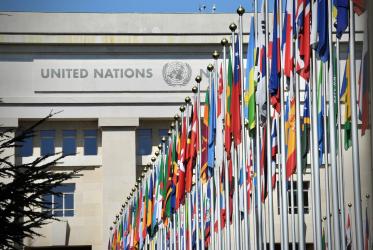Dr Magali do Nascimento Cunha, a Central Committee member of the World Council of Churches (WCC) and professor at the Methodist University of São Paulo, has joined Brazil’s National Truth Commission as a researcher. The commission will investigate human rights violations in Brazil that occurred between 1948 and 1988, including the years of military dictatorship in that country.
Cunha will support one of the twelve working groups of the commission that will focus on role of the churches challenging human rights abuse during the dictatorship.
Cunha’s appointment at the commission was announced on 12 March. Her name was recommended by Anivaldo Padilha, coordinator of the commission’s working group.
“It is with joy that I accept this great challenge of being part of this exciting research,” said Cunha. “The commission was created to make the true history of Brazil known, a history that has been silenced by those in power who in fact instigated human rights violations.”
“The commission’s work is part of the efforts to heal wounds of the past that are still open, and to reconcile Brazil with this past,” added the Methodist theologian and communicator.
The main task of the commission is to investigate the cases of missing people. Official records indicate that around 150 opponents of the military regime are still missing.
The commission was created in 2009, enacted into law in 2011 and established in May 2012. The commission will work for a term of two years with seven people from civil society appointed by Brazilian president Dilma Rousseff.
Brazilian churches taking part in the ecumenical movement have a long history of challenging human right violations during the dictatorship years. In 1979, church workers and lawyers gathered evidence of atrocities committed by the military regime.
The project was called Brasil: Nunca Mais! (Brazil: Never Again). For six years, vital information recording the government’s crimes against the Brazilian people was surreptitiously photocopied and sent from Brasilia to São Paulo and beyond.
The WCC, in cooperation with church leaders of many traditions, was a key supporter of this documentation. Much of the material still remains in the WCC archives in Geneva, Switzerland.
These pages from the WCC archives were delivered to the Brazilian government during a public ceremony in June 2011 and are assisting federal prosecutors in replacing essential data that has gone missing from the files of the Superior Military Court.
“The political position of the churches against the dictatorial regime in Brazil was remarkable, both in supporting resistance movements as well as in challenging repression,” recalls Cunha.
Among people who were killed or went missing during Brazil’s dictatorship were both Christian and lay leaders. On the other hand, there were also Christian clerics who collaborated with the regime and refused support to people from their own churches.
The commission’s working group on churches will retrieve history related to these two stances adopted by the churches, analyzing facts and situations related to human rights violations.
The creation of the specific working group on churches is an outcome of efforts by Anivaldo Padilha along with others who suffered at the hands of the military regime. Many of the people in support of the commission have missing family members.
Padilha, a Methodist, who himself was persecuted during the military rule, recognizes the important task of this working group. "It is essential to make a historical review that allows everyone to be involved, recognizing the establishment of memory as a healing mechanism through which society and institutions can overcome their weaknesses.”
The working group will present its report to the commission in May 2014.
Website of the National Truth Commission in Brazil (in Portuguese)
Healing memories: atrocity documents given by WCC to Brazilian government (WCC news release of 15 June 2011)






